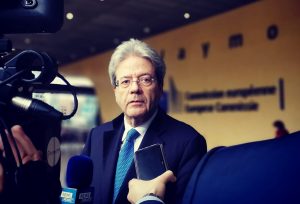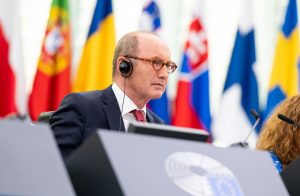According to the prime minister, it is fake news that the country vetoed the aid to Ukraine, because there was no vote.Continue reading
The European Commission has long been calling for qualified majority voting in the EU in a number of areas, and EU citizens backed a move away from unanimity at the conference on the future of Europe, EU Commissioner for Economic Affairs Paolo Gentiloni told a European Parliament plenary session on Wednesday.
During the debate on “Protecting the European Union against the abuse of national vetoes,” the commission said it was compatible with the current treaty rules. He said the EU would also benefit from qualified majority voting in areas such as energy policy, tax policy, common foreign and security policy sanctions, and human rights.
Gentiloni recalled that the main changes introduced by the 2007 Lisbon Treaty included an increase in qualified majority voting in the EU Council and a stronger role for the European Parliament in decision-making. He noted that
the Treaty also introduced bridging clauses, giving the EU Council the possibility to move from unanimity to qualified majority voting in certain areas.

Photo: Facebook Paolo Gentiloni
Gentiloni stressed that the committee supports the extension of qualified majority voting and will work with the other EU institutions on the issue. “The European Commission will always support those who would reform the European Union to make it work better,” he said.
In her speech, Hungarian Fidesz MEP Kinga Gál stressed that the double standards set up in the European Union on the veto issue are unacceptable. “It is serious hypocrisy that while some new, mostly Eastern European Member States of the EU are accused of destroying European unity and vetoing when they courageously stand up for their positions and values, old Member States can do so without consequences in much more serious matters. These instances can only be called ‘lack of agreement,’ never a veto,” she pointed out.
In her view, the very title of the plenary debate reflects this bias and is misleading for political purposes. What is being called a veto here by the liberal mainstream is nothing other than the unanimous decision enshrined in the Treaties, which is the basis for good faith cooperation,” she pointed out.
The MEP recalled that
European integration was created by the Member States, they are the masters of the treaties, which is why the founding fathers guaranteed them the right not to be left out of decisions on issues that are important to them.”
She argued that the abolition of unanimous decision-making would remove the sovereignty of the Member States and would mean the completion of centralization in Brussels. “It would discourage dissent and disagreement and undermine European unity. The EU cannot become a United States of Europe serving federalist interests,” added Gál.
After a speech by Gál, Austrian politician, formerly of the Austrian People’s Party, and EPP MEP Othmar Karas, who chaired the debate, drew the attention of the plenary that “the position of the European Parliament is very clear and the outcome of the conference on the future of Europe is clear: a veto is a veto and we want a more democratic Europe.”

Photo: Facebook Othmar Karas
Karas added that
a veto is a blockade and it is not democratic because it holds back the future.
The EU’s aim has always been to accompany integration with democratization, and unanimous decision-making does not fit in with parliamentary democracy. He noted that his criticism was not only directed at Hungary, but also at the Netherlands and his own country, Austria.
In a Facebook post, Gál responded that in her opinion, Karas had gone way beyond his remit with his comment. “Mr President, you are fundamentally ignorant of the workings of the European Union.
The Union is for the Member States, not the other way round.
You talk about deepening democracy when you want to silence your dissenting colleagues. What is a dictatorship if not this?”, the Fidesz MEP added in the post.
Featured Photo: Facebook European Commission